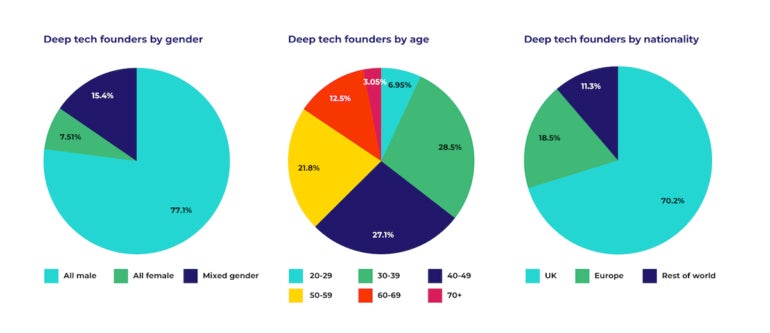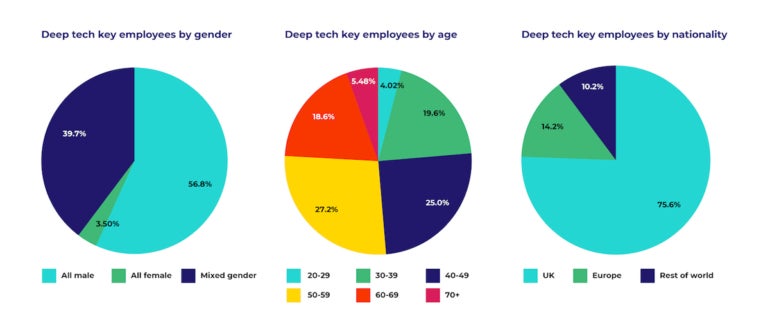A report published by the U.K.’s Royal Academy of Engineering has found that fewer than one in 10 of the country’s deep tech companies is founded by all-female teams, highlighting a stark gender disparity that could hinder growth in the sector if not addressed.
The State of U.K. Deep Tech report found that 77.1% of founding teams are all male, compared to 15% that are mixed gender and 7.5% that are founded solely by women. The report attributed the disparity in part to the low proportion of women studying STEM subjects in the U.K., while also highlighting broader challenges in the investor landscape that are impacting female entrepreneurs and potential founders.
Jump to:
The U.K.’s deep tech diversity challenge
According to the report, the U.K. is home to nearly 3,500 active deep tech companies, 87.2% (3,018) of which are based in England, and the majority are concentrated in London and the South East of England. These companies attracted a total of £5.22 billion ($6.6bn) in 2022, with areas including artificial intelligence, cleantech, quantum computing and VR/AR seeing increased focus from both founders and investors.
DOWNLOAD: TechRepublic Premium’s Cleantech Quick Glossary
However, the lack of diversity in deep tech founding teams (Figure A) poses potential challenges for the sector, particularly in terms of innovation potential and access to diverse markets and perspectives.
Figure A

While representation among executive and senior management teams are more diverse – with 39.6% of U.K. deep tech firms having mixed-gender teams – 56.7% are all male. This means just 3.5% of all deep tech companies are led by all-female teams (Figure B).
Figure B

A familiar tech diversity problem
The Royal Academy of Engineering’s report echoes findings published by the Alan Turing Institute in October 2023, which found that AI startups founded by all-female teams accounted for just 2.1% of funding deals between 2012 and 2022. These all-female teams have secured only a mere 0.3% of the £69.5 billion ($87.9bn) of VC funding raised by AI startups during that period.
While the RAEng report noted that gender diversity was “improving among deep tech companies as they grow and expand beyond their initial founding teams,” it also highlighted the historically low participation of women and girls studying STEM subjects in the U.K. as a reason behind the lack of female representation.
This has seen an uptick in recent years and may improve the diversity of deep tech founders in the coming years, the report said. However, it also suggests that this gap might partly stem from investor biases, underscoring the need for stronger support systems for female entrepreneurs.
Ana Avaliani, director of the Royal Academy of Engineering’s Enterprise Hub, said in a press release: “While there is much to celebrate, the State of U.K. Deep Tech underlines the important work still to be done to support deep tech founders to scale and grow their companies in the U.K. It is also vital for a more successful, inclusive ecosystem that the gender imbalance in deep tech leadership is addressed and that leadership diversity in deep tech enterprises is championed.”
The benefits of boosting diversity
Numerous reports over the years have highlighted the benefits of improving diversity, equity and inclusion within organizations in terms of boosting workplace culture and job satisfaction, as well as the performance of the business itself.
According to McKinsey’s 2023 report, Diversity matters even more: The case for holistic impact, companies in the top quartile for gender diversity on executive teams are 39% more likely to outperform their peers financially, compared to 15% in 2015. Likewise, companies in the top quartile for board-gender diversity are 27% more likely to outperform financially than those in the bottom quartile.
How to increase female participation in deep tech
RAEng’s report underscored the need for targeted initiatives and policy changes to encourage greater female participation and leadership in deep tech, which could lead to more diverse perspectives and innovation in the sector.
To address this, the report suggested increasing support for women entrepreneurs, potentially through targeted funding, mentorship programs and networking opportunities. Additionally, promoting STEM education among girls and women can help increase the pool of potential female founders in the future.
DOWNLOAD: TechRepublic Premium’s Diversity and Inclusion Policy
Commenting on the report, Michelle Donelan, the U.K.’s science and technology secretary, said she was “committed to boosting STEM uptake among people from all backgrounds, to ensure everyone can fulfil their potential as we build a highly skilled workforce in the industries of the future.”
Donelan added: “We are a global leader in artificial intelligence, quantum computing and other emerging forms of deep tech. To maintain this position, we are working closely with partners like the Royal Academy of Engineering to harness talent up and down our country.”
Avaliani told TechRepublic via email that a lack of financial support and gender biases presented two of the biggest challenges faced by women entrepreneurs, citing a report by Beauhurst that found that less than 2p (2.5 cents) in every £1 of U.K. equity funding went to all-female founder businesses in 2022.
“Investors and businesses can offer meaningful help by backing women-led businesses, giving them an opportunity to bring more diverse products and services to market and deliver financial and economic benefits,” Avaliani said.
Removing barriers, improving access to networks and celebrating role models are also key strategies to enhance gender diversity in the deep tech sector, Avaliani said, pointing to initiatives like Diversity VC and Future VC, which focus on increasing diversity in the venture capital process.
“Diversity in the investment community is still lacking,” she added.
“Significant systemic changes are needed to deliver the step change that is required if we are to move the needle. This goes from hiring diverse talent to investing in founders from underrepresented groups to gathering diversity data of portfolio companies, diversity of their own teams and committing to measuring progress.”
At a glance: The U.K.’s deep tech sector
The report found that cleantech and AI currently dominate the U.K.’s deep tech sector, represented by 517 companies and 504 companies, respectively.
AI is being widely leveraged for applications like manufacturing and drugs discovery, the report said, with the U.K. government investing heavily in AI initiatives in recent months.
The growing urgency to tackle environmental challenges is also driving demand for the U.K.’s advanced technology sector, especially in cleantech, clean energy generation and energy reduction tech, the report said.
This has been prompted in part by strong governmental and regulatory backing, with the U.K. Department for Business, Energy & Industrial Strategy’s Energy Innovation Programme having earmarked £505 million ($638m) to finance the commercialisation of clean energy technologies from 2015-2021.
The report pointed to broader funding challenges in the U.K. deep tech sector. While equity investment in deep tech has grown considerably over the last decade – from £174 million ($220m) to more than £5 billion ($6.3bn) – 2022 saw a slight decrease in the total number of deals.
RAEng said this was due to “a complex funding environment” and wider economic challenges that meant investors were being more cautious with their money.
Report methodology
The State of U.K. Deep Tech report was based on data commissioned from Beauhurst, a data platform that provides information on private companies in the U.K.
Companies in the U.K.’s deep tech sector were identified using Beauhurst’s high-growth tracking criteria, which includes aspects like equity investment, accelerator attendance and academic spinouts. The report included companies incorporated on or after January 1, 2013, which were classified based on specific Standard Industrial Classification codes or sector classifications relevant to deep tech. Companies offering consultancy services or pure software were not included.

